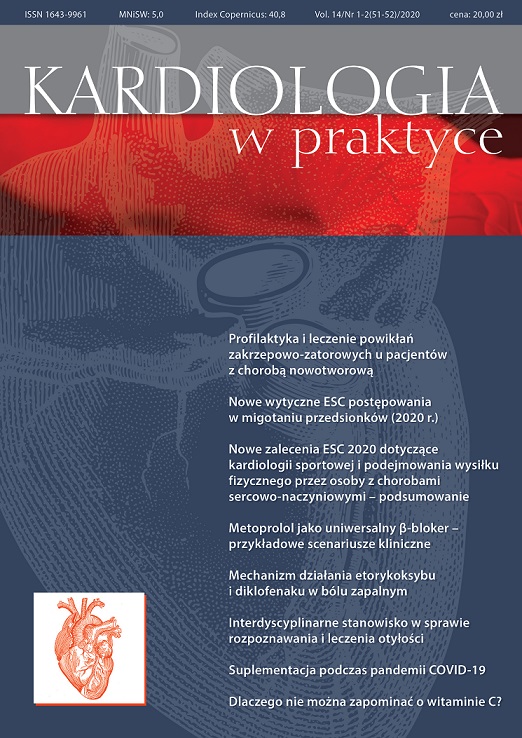Dlaczego nie można zapominać o witaminie C? Artykuł przeglądowy
##plugins.themes.bootstrap3.article.main##
Abstrakt
Witamina C odgrywa ważną rolę w kształtowaniu układu odpornościowego, wykazując właściwości przeciwzapalne, immunomodulujące, przeciwutleniające, przeciwzakrzepowe i przeciwwirusowe. Może także korzystnie modulować reakcje gospodarza na wirusa SARS-CoV-2, powodującego COVID-19.
Pobrania
##plugins.themes.bootstrap3.article.details##

Utwór dostępny jest na licencji Creative Commons Uznanie autorstwa – Użycie niekomercyjne 4.0 Międzynarodowe.
Copyright: © Medical Education sp. z o.o. This is an Open Access article distributed under the terms of the Attribution-NonCommercial 4.0 International (CC BY-NC 4.0). License (https://creativecommons.org/licenses/by-nc/4.0/), allowing third parties to copy and redistribute the material in any medium or format and to remix, transform, and build upon the material, provided the original work is properly cited and states its license.
Address reprint requests to: Medical Education, Marcin Kuźma (marcin.kuzma@mededu.pl)
Bibliografia
2. Marik PE. Vitamin C. An essential stress hormone during sepsis. J Thorac Dis. 2020; 12(suppl 1): S84-S8.
3. Zhang J, Rao X, Yiming L et al. High dose vitamin C infusion for the treatment of critically ill COVID-19. Pulmonology (in review). http://doi.org/12.203/rs.3.rs.52778/v1.
4. U.S. National Library of Medicine. Use of Ascorbic Acid in Patients With COVID 19. 2020. http://clinicaltrials.gov/ct2/show/NCT04323514.
5. May JM, Qu ZC. Ascorbic acid prevents oxidant-induced increases in endothelial permeability. Biofactors. 2011; 37: 46-50.
6. May JM, Harrison FE. Role of vitamin C in the function of the vascular endothelium. Antioxid Redox Signal. 2013; 19: 2068-83.
7. Carr A, Maggini S. Vitamin C and Immune Function. Nutrients. 2017; 9(11): 1211.
8. Holford P, Carr AC, Jovic TH et al. Vitamin C – An Adjunctive Therapy for Respiratory Infection, Sepsis and COVID-19. Preprints. 2020: 2020100407. http://doi.org/10.20944/preprints202010.0407.v1.
9. Arvinte C, Singh M, Marik PE. Serum levels of Vitamin C and Vitamin D in a cohort of critically ill COVID-19 patients of a North American Community Hospital Intensive Care Unit in May 2020. A Pilot Study. Med Drug Discov. 2020; 8: 100064. http://doi.org/10.1016/j.medidd.2020.100064.
10. Chiscano-Camón L, Ruiz-Rodriguez J, Ruiz-Sanmartin A et al. Vitamin C levels in patients with SARS-CoV-2-associated acute respiratory distress syndrome. Crit Care. 2020; 24(1): 522.
11. Hemila H. Vitamin C and SARS coronavirus. J Antimicrob Chemother. 2003; 52(6): 1049-50.
12. Fowler AA, Truwit JD, Hite RD et al. Effect of vitamin C infusion on organ failure and biomarkers of inflammation and vascular injury in patients with sepsis and severe acute respiratory failure: the Citris-Ali randomized clinical trial. JAMA. 2019; 322(13): 1261-70.
13. Böhm F, Settergren M, Pernow J. Vitamin C blocks vascular dysfunction and release of interleukin-6 induced by endothelin-1 in humans in vivo. Atherosclerosis. 2007; 190(2): 408-15.
14. Peng ZY. Vitamin C Infusion for the Treatment of Severe 2019-nCoV Infected Pneumonia. 2020. http://clinicaltrials.gov/ct2/show/NCT04264533.
